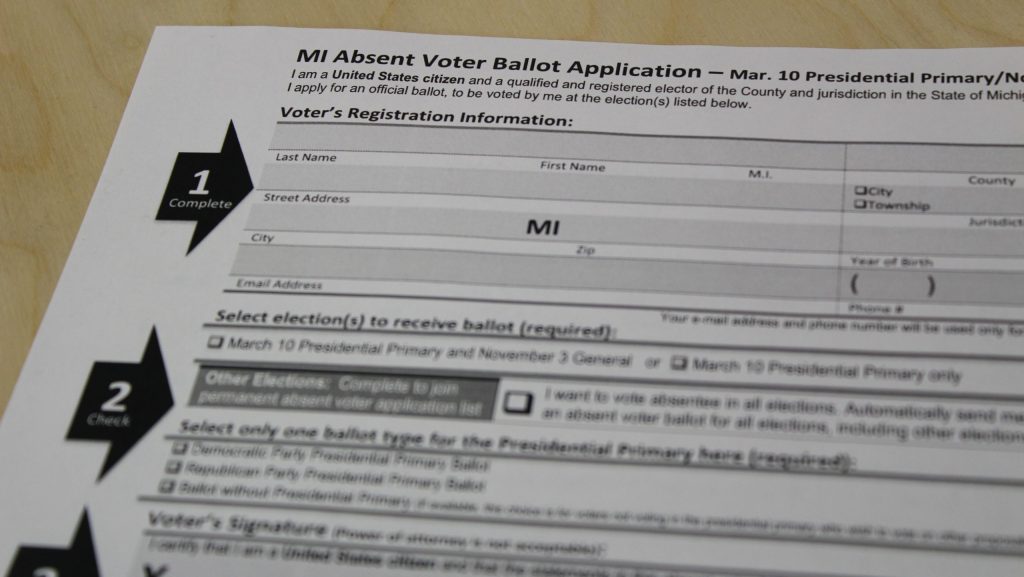COVID-19 Forces Local Clerks to Confront Election Safety, Complications
It’s too soon to tell whether it will be safe to vote in person later this year, but election officials have begun planning efforts for both scenarios.

The COVID-19 pandemic is affecting planning efforts for this year’s August primary and November general elections. Among a number of issues city clerks are facing is worker protection at polling locations and an expected surge in absentee voting.
Officials say the average age of an election worker in Michigan is about 74-years old — a high risk age group for the virus. Rochester Hills city clerk Tina Barton says she’s still figuring out how to keep them safe.
“Money is part of the solution. Preparation is part of the solution. But the third element of this is that the majority of people are going to vote absentee.” — Tina Barton, Rochester Hills city clerk
“How do I recruit workers to replace the ones that aren’t feeling comfortable quite yet being in that type of a scenario?” Barton asks. “So it becomes a recruitment issue.”
Barton says the virus could also impact a number of traditional polling locations.
“For instance, assisted living facilities, senior club houses, or churches,” she explains. “Right now, number one, the senior community is a high risk community, and then currently churches are not allowed to congregate yet in Michigan.”
Barton says she’s actively moving voting precincts in Rochester Hills out of such locations to avoid problems down the road. While it’s too soon to tell whether it’ll be safe to hold elections in person, she says she’s concerned about having enough resources to process an increased volume of absentee ballots if voting is primarily conducted by mail. Currently, clerks are not allowed to start processing ballots until the morning of the election.
Click on the player above to hear city clerk Tina Barton on election planning during the COVID-19 pandemic, and read a transcript below, edited for length and clarity.
Alex McLenon, 101.9 WDET: With COVID-19 concerns ongoing, how are officials preparing for this year’s elections?
Tina Barton, Rochester Hills City Clerk: We’re looking at some of the issues as we move forward considering the voting scenario. Will we be looking at the traditional scenario of precinct as well as absentee voting, or is this maybe a vote-at-home model? So as a city clerk, I’m basically doing scenario planning.
We look at both scenarios. How are we fully prepared not only to protect those who would be working, but also to provide them with the tools that they are going to need to pull off an election?
What does it normally cost to hold an election?
Typically for an average election in Rochester Hills we’d probably be looking at around $75,000, depending on the size of the election. Obviously we’re looking at those costs being much higher this time in order to accommodate what the special needs would be.
When you’re looking at the fact that we are a community that has about a $50 million budget and we’re already projecting at least a $7 million hit to that budget, that’s substantial. I can only imagine what communities like the city of Detroit would be looking at — who have taken an even larger hit to their budget, have a more precincts to accommodate, and workers to protect.
Is this something that only money can fix? Or is having the extra time to prepare all that it takes to pull off an election?
Well, obviously money is part of the solution. Preparation now is part of the solution. But the third element of this that we need to talk about is that regardless of whether the precincts are open or if we’re in a vote-at-home type scenario, I would say the majority of people are going to vote absentee in August and November. They might do it out of ease, because you no longer need a reason in Michigan, and they might do it out of concern for their health and safety. Either way we’re going to see an increase, which we were already anticipating in Michigan.
We’re already, as city clerks, in the process of urging our legislature to do something to allow us more time to process absentee ballots. If we’re now in a situation where we’re looking at doubling what we were expecting prior now that we’re in a pandemic. So they need to recognize that we cannot start doing this on Election Day at 7:00 a.m., count thousands of ballots and not stop until it’s done. It’s unrealistic, it’s not safe, and it will impact the integrity of the election.
The Bipartisan Policy Center has put out a report stating that in these types of scenarios where you have large absentee volume, clerks should be allowed up to 15 days to start preprocessing absentee ballots. We can determine what processing means, but the fact of the matter is we have to have more time in Michigan.
Trusted, accurate, up-to-date
WDET is here to keep you informed on essential information, news and resources related to COVID-19.
This is a stressful, insecure time for many. So it’s more important than ever for you, our listeners and readers, who are able to donate to keep supporting WDET’s mission. Please make a gift today.
